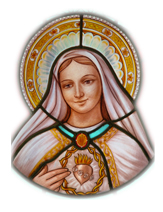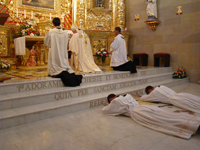On Friday, June 10, 1977, the Blessed Virgin Mary appeared in a wood, later called "Wood of Our Lady", located close to a little village called Le Fréchou, in the department of Lot et Garonne, South Western France.
To her confidant Father Jean-Marie, a young religious favored with mystical graces, Our Lady presented herself as "Mary, Mother of Mercy and Mother of the Church."
Weeping over France, over the Church and over the world, she requested her children to come to that place in pilgrimage, and promised that she would come on both the 1st* and 14th of each month.

(*During one of her Apparitions, Our Lady said that in the future she would only come on the 14th.)
Now, for more than 30 years, Our Lady, faithful to her promise, has been coming on the 14th of each month, giving in this blessed wood her Messages of peace, hope, love and mercy, to console those who suffer, cure so many exhausted bodies, and so many bruised souls.
Very quickly, the news about the Apparitions spread out, and for months and years, waves of pilgrims coming from France and elsewhere never ceased to increase. Some are convinced of the facts, others, more curious and skeptical; but just like Saint Paul on the road to Damascus, they have been overwhelmed by grace and have recovered, at the foot of the humble oak tree where Our Lady appears, the faith of their early years, and they testify to the veracity of the Apparitions.
All of them take to heart to answer Our Lady's call: "To be faithful to the Holy Rosary, to pray together in the family, attend the Holy Sacrifice of the Mass with respect and dignity, adore the Blessed Sacrament,..."
In one of her Messages, Our Lady had requested her confidant, Bishop Jean Marie, who received the sacerdotal ordination and Episcopal consecration from Archbishop Pierre Martin Ngo Dinh Thuc, to found a religious congregation for men, a religious congregation (active) for women and another one for contemplative life, a Third Order, social works and more.
On May 22, 1979, our Lord reiterated his wish to see a community of Nuns be established, as Servants of his Most Holy Mother. One year later, on March 19, 1980, the first feminine religious vocations would start their Postulate as Servants of Our Lady and receive, the same year, their holy Habit. Very soon, more vocations arrived: vocations from every walk of life, every age, answering our Lord's call on August 14, 1981:

"Young men, young ladies, the young and the not so young, may nothing stop you, may nothing trouble you, may nothing turn you away from your vocation. Join me at Le Fréchou, in the religious family I have wanted, and which is dear to me…",
united by a common desire to work in the Lord's field.
A foundation that does not drive its roots from ordeals and the cross would not be solidly established. Hardship soon visited Fraternite Notre Dame, with the premature death, on January 31, 1981, of one of the first nuns, Sister Marguerite Marie of the Heart of Jesus.
Because new vocations joined Fraternite Notre Dame, its Founder and Superior General, Bishop Jean Marie was able in the 80s to set up social and charitable actions: all of which were based upon great principles found in the Gospel, that are charity and love of one's neighbor.
Let us mention here, among other initiatives, the organizing of summer camps for the youth, creation of a printing shop to spread the Messages from Our Lady of Fréchou, construction of a Seminary, opening of a school, erection and consecration of the Chapel of Our Lady of Frechou, Liberator of the Souls in Purgatory, thus responding to the Message given by Our Lady on March 14, 1979.
During the 1990s, Fraternite Notre Dame expanded on the international level, with the opening of religious and humanitarian Missions on four continents. When seeing the physical and moral distress of the poor, the starving, the sick (especially those afflicted with HIV and AIDS), prisoners and orphans,... Bishop Jean-Marie wished that Fraternite Notre Dame's members be at the service of all, as instruments of peace and mercy. Then were opened soup kitchens and weekly food pantries in Paris, New York, Oulaanbaatar (Mongolia) and Chicago, allowing most destitute people to get at least a decent, daily meal.
The sick have not been forgotten either: visits to the sick in hospitals, assistance to those affected with AIDS, opening of a hospital for the poorest of the poor in Mongolia; and also humanitarian convoys to benefit those victimized by war in Rumania, Croatia, Bosnia, Kosovo, Rwanda, etc.
Bringing love to those isolated, orphans, the rejected, in Haiti, Cameroon, Niger; keeping in mind that all these activities are to be edified upon prayer, the Sacraments, the Holy Sacrifice of the Mass.
Thus, Fraternite Notre Dame provides the spiritual support which the souls so much thirst for, in these our present days: spiritual support offered on a daily basis in Cameroon, at the various priories of Fraternite Notre Dame, by the side of the bedridden and those dying in hospitals; this spiritual aid has now found its full force and expression in Chicago, with the consecration of the Shrine of Our Lady of Fréchou, Mother of Mercy and Mother of the Church, on October 21, 2000.
More than 30 years ago, in a humble wood, the Immaculate Virgin appeared to Bishop Jean-Marie. Ever since then, Fraternite Notre Dame's members have attempted, everyday around the world, to realize what Our Lady requests during each one of her Apparitions.
However, let us not forget that if so many things have been accomplished, despite certain persecutions, and at the price of so many tears and sacrifices, it is thanks to the example, encouragement and action of the Founder and Superior General, Bishop Jean-Marie, a living example of abnegation, charity, dedication of his entire self, body and soul, to all those who suffer, with no distinction of race, class, sex, age or creed.
Consumed with the desire to save souls, he goes throughout the world, as does the Good Shepherd looking for the lost sheep. The Most Reverend Bishop Jean-Marie, to whom we owe homage and testimony for so much dedication and so much listening to those in need, is a genuine instrument of Peace, as was Saint Francis of Assisi.